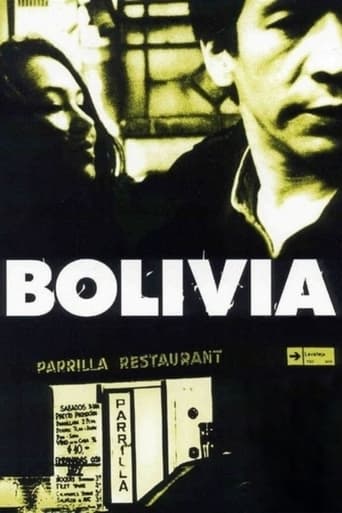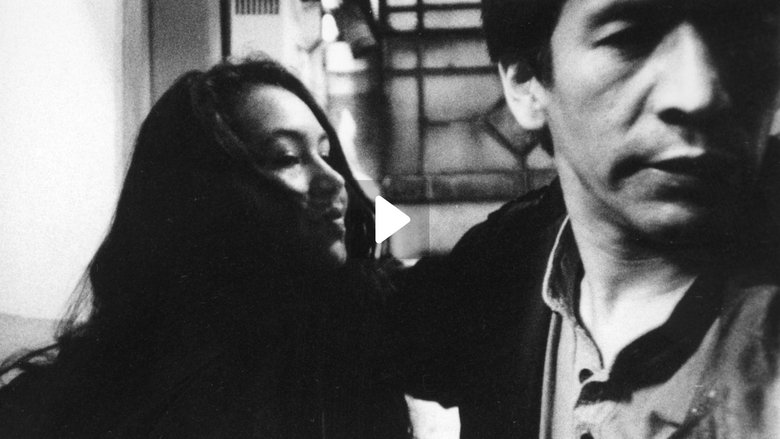

Bolivia (2001)
Freddy emigrates to Buenos Aires in search of a more prosperous life. In his native country, Bolivia, he left his family. But the capital of Argentina is not the paradise he dreamed of, and much less for illegal immigrants like himself. But even with that, he gets a job as a griller in a restaurant.
Watch Trailer
Cast


Reviews
This movie seemed slow and unimpressive at the beginning. As the movie progressed, however, its true depth was evident. It is a true representation of the life of an immigrant in a foreign community filled with prejudice, but it is not the stereotypical coming to America story. Freddy, an illegal immigrant in Argentina, struggling to support his family back in Bolivia slowly, and almost silently, wins the hearts of the audience and the story shines through despite the strange camera angles and the footage being in black and white. The majority of the film takes place around the bar in the small corner café and the prejudice is evident in almost every interaction, be it in the soccer game on TV or in the face to face encounters that happen across the bar. In the final scene, after Freddy's death, the bar owner simply replaces his 'help wanted' sign, showing that to him Freddy was nothing more than a means to an end and is easily replaced.
Bolivia is a relatively short and simple movie which contains many cinematographic techniques which transmit different messages and themes to the audience. The plot of the film revolves around an immigrant from Bolivia who finds a job in Argentina as a cook at a restaurant-bar. The director uses several different camera shots as a means of revealing the main setting, in the restaurant, and providing insights on the new life of the newcomer. Moreover, through the use of high angles at certain points and the black and white coloring of the whole movie, the author lets the audience know that there is a bigger issue which drives the whole movie racism. This issue is hinted at by the angles and color of the filming, but then it is made evident by the dialogue which is exchanged by people at the bar and the actions which follow up. The movie is certainly worth watching with an artistic and appreciative eye.
Argentina, like some countries in the industrialized world, is being invaded by illegal immigrants from neighboring countries, mainly, Paraguay and Bolivia, where the poorly paid workers believe in going away in search of badly needed money to feed the family they left behind. These poor, unskilled workers are in for a big surprise: the people of the countries they immigrate to, don't want them! Never mind they only take the work that no one else wants to do.The story of Freddy, a Bolivian, is probably universal. As he arrives in Buenos Aires, he finds work in the small restaurant owned by Enrique, who promises to pay Freddy fifteen pesos a day, which is not even five dollars! With that, Freddy has to live and try to save to send home to his wife and children in La Paz. Freddy is expected to work from 7 in the morning until late at night. He is basically the only employee in the place, where he is a cook, tends bar, and does everything the boss, Enrique expects him to do. The other employee, Rosa, is from Paraguay.At the bar, a series of low-life individuals gather to socialize, watch television, as they use the place as their own club. Oso, the unemployed taxi driver is the first one to show his own prejudice against Freddy, who has not been disrespectful to him. Oso complains about how the illegals are taking over. He knows it well because, he, himself, is from Uruguay and has found a home in Buenos Aires. Oso will be instrumental in what happens to Freddy at the conclusion of the story.After his first day in the restaurant, we follow Freddy as he roams the streets of the neighborhood next to the place he works. He is stopped by two policemen who not only are rude to him, but in their eyes, he is guilty of something they haven't decided about. Freddy ends the night in a lonely bistro where he orders coffee and falls asleep. Rosa, the kind waitress, takes pity on him the following night and takes him to the hotel where she has a room. Before that, they have stopped at a club that caters to Bolivians, and Freddy, who has drunk a bit too much, makes a pass at Rosa.Adrian Caetano, the director, also co-wrote the screen play with Romina Lafranchini. "Bolivia" packs a lot in only 75 minutes of screen time. Mr. Caetano plays with our emotions in the way he presents a good man who is willing to work, yet, circumstances beyond his control make him the butt of the hatred people feel about the poor immigrant who is only doing a minimal job to survive. Mr. Caetano, uses the gritty black and white cinematography of Julian Apezteguia to surprising results.Freddy Flores is seen as the Bolivian man trying to eke out a living for himself and his family. Mr. Flores is a natural, as we never feel he, or for that matter, the rest of the cast, acting. Rosa Sanches is perfect as the stoic waitress who never tells us anything about herself. Enrique Laporace makes an excellent contribution as the owner of the restaurant. Oscar Bertea plays the brutish Oso."Bolivia" is a small film, but it holds our attention because of what director Adrian Caetano has done with the story about human beings that roam the globe in search of a meager salary, for them and their families, only to get the scorn from the people that benefit from their labor.
The life of illegal immigrants, in Buenos Aires or in another place in the world, is a black & white life, the colors are off. For telling the routine of a Bolivian cook, alone, sleeping in a bar, with his wife and children living 1500 miles away, disturbed everyday by police asking for his papers, white and black are enough. You won't find here famous actors or great special effects. Almost the whole movie occurs in a cheap neighbourhood bar. But the story is universal, it could be a Turkey in Munich, a Tunisian in Marsella or a Mexican in Los Angeles.Hector Kesselman, Buenos Aires, Argentina




